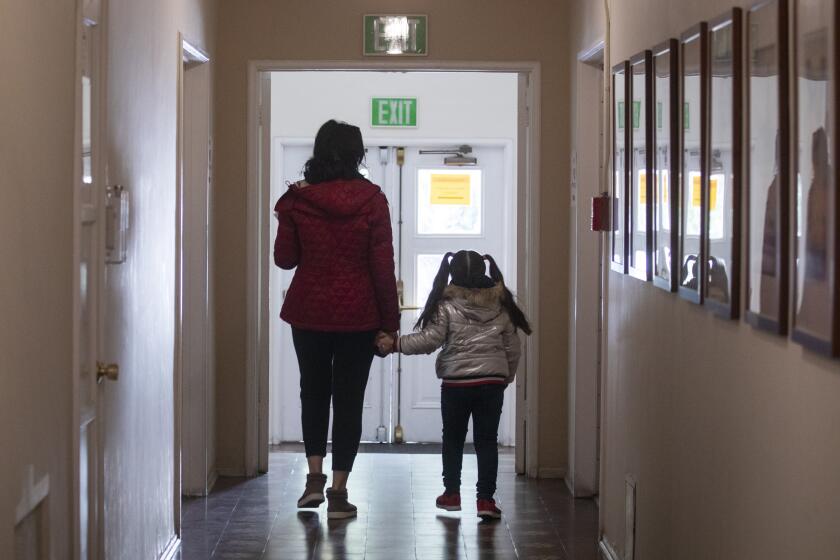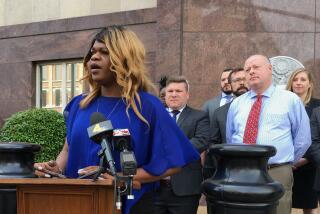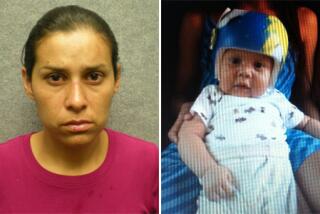A mom was convicted of murder after her abuser killed their baby. Now she could be freed

The California Supreme Court has overturned a Central Valley woman’s murder conviction in the 2018 killing of her 2-month-old son, ruling that the law often holds victims of domestic violence to an unfair double standard in the deaths of their children.
The court on Monday ordered the woman, Brittney Collins, to be resentenced, and family violence experts said the ruling is an important step toward more just treatment for mothers under the law.
A Kern County jury convicted Collins after her boyfriend, Matthew Norwood, fatally assaulted their son Abel in a methamphetamine-fueled rage, court records show.
Although it was Norwood who slammed Abel against the wall or the floor of their Tehachapi mobile home — breaking his arm, leg and ribs, lacerating his liver and cracking his skull, according to court papers — local authorities alleged Collins was legally liable for failing to protect him.
“Mom’s the person that takes care of the baby,” court records show detectives told Collins after the incident. “Mom’s the person that protects their baby. Right?”
Prosecutors argued Collins knew Norwood was dangerous because he’d brutalized her throughout her pregnancy, choking her, kneeing her in the stomach, slamming her head into the wall, and pushing her to the ground in an attempt to cause a stillbirth. According to court records, when Collins was asked how her boyfriend could inflict violence on an infant, she replied: “He chokes me so why would he not choke a baby?”
The trial court sentenced Collins to 15 years to life following her conviction. On her first attempt to overturn the conviction, the court of appeals said she knew Abel would be fussy the day after his 2-month vaccines, and should have predicted Norwood’s fatal outburst in response.
Programs that serve victims of domestic violence are bracing for unprecedented cuts that will also affect rape crisis hotlines, child abuse centers and legal service providers across California.
But the high court took the opposite view of the evidence, drawing extensively from new research into the dynamics of family violence, its prevalence among women convicted of murder and manslaughter, and the “criminalization of motherhood” under “failure to protect” statutes across the U.S.
“There is no evidence that Collins knew with substantial certainty that Norwood intended to [kill Abel],” Judge Kelli M. Evans wrote in her decision. “Collins (and her grandmother) were under the impression that Norwood would be changing and feeding Abel as he had done before.”
Norwood’s ongoing abuse — he had a previous conviction for domestic violence — would have made Collins acutely aware of the danger he posed to her if she tried to intervene, the judge said.
“It is problematic to use the fact that an individual has been abused by their partner to hold that individual criminally liable for their partner’s conduct,” Evans wrote.
Academic researchers have identified hundreds of California women incarcerated for murder or manslaughter in cases that involved intimate partner violence.
Andrea N. Cimino, co-author of a 2024 Stanford Law Criminal Justice Center report cited in Judge Goodwin H. Liu’s concurrence in the recent case, said “failure to protect” laws “unfairly target women,” particularly abuse victims such as Collins.
Cimino asked: “Why is she criminalized for the act that he did?”
The Stanford study identified many other similar cases where woman were found liable for child deaths, even when they were not present when the killing occurred or were actively trying to stop the act as it happened. Some could not defend their children because they’d been beaten or strangled unconscious by the same attacker.
Like Collins, who was in her late 20s when her son was killed, many abuse victims are also dependent on the men who abused them and their families — for housing, money and food. Collins had no power to make Norwood leave the Willow Springs mobile home park where they lived with her grandmother, and no means to escape him after he drained their accounts, court documents show.
She had also nearly died during Abel’s emergency cesarean birth, and developed a serious infection after it. Although she worried his father might be abusing him, she relied on Norwood to help care for the baby while she recovered, according to the appellate court record.
These dynamics are common in abusive relationships that turn deadly, experts say. Yet, they are still not well accounted for in the law or clearly understood by the legal system — something experts hope this ruling may change.
It wasn’t long after the televised spectacle of O.J.
“This is the kind of case that we’re seeing more and more of,” said professor David A. Sklansky of the Stanford Law School. “The court used this case as an opportunity to provide guidance,” rather than strike down the statute entirely.
While the decision doesn’t overturn failure-to-protect homicide, or reject the legal principle behind it, it illustrates how the law is often used unjustly, the professor said.
“Assumptions about what Collins should have done based on outmoded, gendered notions of a mother’s — as compared to a father’s — role in caring for a child are not proper in determining a mother’s liability for murder based on failure to protect,” Evans wrote.
“Prosecutors and courts must take care to ensure that this type of gender bias does not infect our criminal justice system.”
More to Read
Sign up for Essential California
The most important California stories and recommendations in your inbox every morning.
You may occasionally receive promotional content from the Los Angeles Times.













